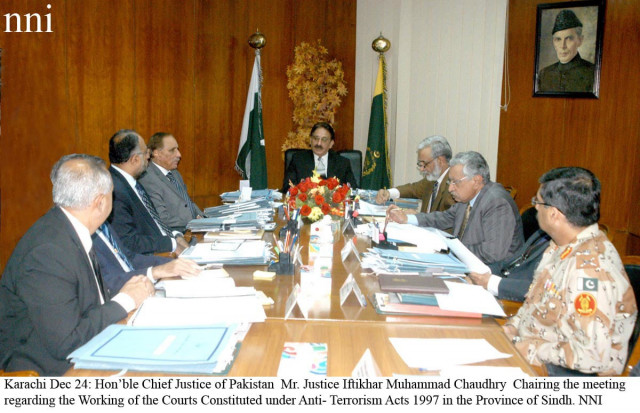Karachi suo-motu case: Fear of law is gone if sentences are not carried out, says Supreme Court
Attorney General assures early disposal of mercy petitions.

The Supreme Court of Pakistan expressed concern over delays in execution of sentences, mostly due to mercy petitions that are pending before the executive since long.
A high-level meeting held to review the performance of the anti-terrorism courts of Sindh on Saturday noted that these delays are counter productive for the deterrent effect of the law.
A press release issued after the meeting, presided over by the Chief Justice of Pakistan, Iftikhar Muhammad Chaudhry, said that since 1998 some 30 people convicted under the Anti-Terrorism Act and four others, convicted under ordinary laws, were awaiting execution. On account of this unusual delay in execution, the deterrent effect of the law is missing, the press release said.
The Attorney General of Pakistan undertook to look into the matter and expeditiously decide the mercy petitions so that the course of administration of justice is not impeded. It was stressed that the anti-terrorism law is fairly stringent with provisions for time-bound decision in the cases, primarily to check the incidents of terrorism and violence by punishing the culprits, thereby creating a deterrent effect on society, the press release said.
It further said that the chief justice expressed dissatisfaction over the performance of the ATCs particularly low rate of disposal due to frequent adjournments on different accounts granted to the prosecuting and defense sides.
Referring to judgment in the Shaikh Liaqat Hussain case, the chief justice observed that the Supreme Court had set up a mechanism for monitoring the performance of the ATCs to quickly decide such cases, said the press release adding the mechanism is meant to remove handicaps or irritants in the way of expeditious disposal of cases.
The Chief Justice also observed that the menace of terrorism also came up for consideration before the five-member bench in the suo motu case regarding law and order situation in Karachi and the Supreme Court issued categorical directions to the provincial police as well as Rangers for apprehending the culprits and timely investigation in the cases and their effective prosecution, so that those found guilty are sent behind the bar.
Sindh police chief informed the meeting that during the five months’ period from 24th July till date a total of 240 cases were registered and 291 accused were arrested under the ATC law. The challans in respect of 130 cases have been submitted in courts.
The press release further said, the meeting took notice of the reports to the effect that some influential accused persons, arrested by the Rangers and handed over to police for investigation, were given the benefit of being charged under section 13-D of the Arms Ordinance 1965 (carrying arms without license), carrying lesser sentence, even though the provisions of the ATC law were attracted because of which, such accused persons got released on bail by the courts.
The Chief Justice of Pakistan directed that such leniency is unwarranted and against the law. The IGP reported that on the allegation of showing partiality and favour to an accused namely Muhammad Salim alias Choto, disciplinary proceedings have been initiated against SP Umar Khattab and other such like complaints will also be investigated, it said .
CJP observed that any leniency or favour to any accused is against the law and any officer responsible shall be taken to the task.
No Go Areas
The chief justice also ordered Pakistan Rangers and the police to ensure implementation of judgment in Karachi target killings case and to end all “No Go Areas.”
He asked the security agencies to follow the direction given in the Karachi violence case that there must not be any no-go area and if any such area is found or reported, the police and Rangers should take strong and decisive action to eliminate it.
According to a press release, the DG Rangers has to lead a raid to end the no-go area if such a need arises.
Published in The Express Tribune, December 25th, 2011.



















COMMENTS
Comments are moderated and generally will be posted if they are on-topic and not abusive.
For more information, please see our Comments FAQ